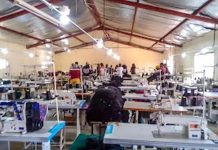Africa-Press – Lesotho. THE Revolution for Prosperity (RFP) says it might consider banning the importation of agricultural products from South Africa to promote the domestic market when it wins power in October.
The party’s spokesman, Mokhethi Shelile, said this in an interview with thepost in reaction to the launch of a new agricultural produce market centre for the northern region last week.
Shelile, who was once the head of the Domestic Investment Promotion Division at the Lesotho National Development Corporation (LNDC), told thepost that such a ban would help boost local farmers.
He said for that to be effective, there would be need to support local production as the first stage. “This is the major challenge for the market sectors currently,’’ Shelile said.
He said since the farmers’ capacity is still low, only a few products such as potatoes are banned this season. Shelile said the production sector will need special attention to help the market centre. Once they form government, he said they will immediately implement the idea to boost local farmers.
Shelile said an RFP government is going to establish markets where farmers will be able to sell the products even before they can start with the production so that they secure the financial means of increasing the production.
He said they realised that there are farmers who are still losing on their products because they cannot access markets. “We want to give farmers a market even before they can start,’’ he said, adding that this will encourage farmers to increase their capacity and improve their standards.
The Lesotho National Farmers Union (LENAFU) programmes manager, Khotso Lepheane, said the setting up of the market centres will boost the farming industry in Lesotho.
“For the longest time this concept has been a good idea,” Lepheane said.
“Many potato farmers, amongst others, have benefited from this (Maseru) centre,” he said.
However, he said this concept introduction lacks a strong system which will encourage the retailers and the final consumers to buy from the market centre.
“This has caused a stagnation of products from reaching the consumers,” he said.
“This has discouraged many farmers from taking their products in the markets centre since it takes time for the products to be sold out and this might lead to damage of products.
He said most of the farmers still consider the old method much safer.
As much as the initiative is good, he said the concept cannot achieve its goal unless the market is channelled to market centres rather than seeing retailers and consumers importing what the country is producing.
“This is one of their biggest diversification mechanisms to commercial agriculture hence there are still some pricing challenges,” he said.
However, he said the cost is still bearable as compared to the role the centre plays. He said farmers still consider it as part of the change not a hiccup.
Despite the challenges, he said they are still playing their role to educate farmers on how to improve their capacity and quality. He said they also teach farmers on how the commercial sector works so that the pricing issues cannot tarnish the good initiative.
He said they are also working with different departments to smoothen the supply chain. Lepheane said they want to see more market centres being established in all the regions.
The Manager of Maluti Fresh Produce, Nthako Supi, said the market centre has the potential to encourage high productivity and boost the economy of the country.
He said for the past 10 years, they were able to gather about 240 farmers who were growing crops, vegetables and fruits. He said this year they were able to gather about 87 potato farmers and over 6 200 bags were sold out.
He said they have a transparent system which allows the farmers to know and see how their products were sold and how they work. He said the centre is only entitled to the commission of the money they generated when the product is sold.
“The product belongs to the farmers until it has been sold out,’’ he said.
As much as they tried to improve their system for the sustainability of the centre, he said they still have some challenges which need to be addressed for its sustainability.
He said the consistency and low productivity from the farmers’ side as one of the major challenges. The setback, he said, is that the place where the market side is located is far from the traffic and shops hence the number of customers is still low.
Supi said the major challenge is the tight competition they had with the South African producers. He said most of the retailers and final consumers still consider buying the products in South Africa rather than supporting the market centre.
“We currently have more potatoes in our storage which are not performing so well in the market due to tight competition,’’ he said. He said this is triggered by inconsistency of local farmers in terms of quality and quantity.
“Consumers buy what attracts their eyes, so if today consumers get a good quality product and tomorrow they get something different they lose hope in us,’’ he said.
“For the market centre to continue functioning, the market has to be regulated.
The Public Relation Officer in the Ministry of Agriculture, Lereko Masupha, said Lesotho still needs to import basic products from South Africa because local farmers are not able to meet demand.
“However, our consumption is so high hence we still need products from other countries,” he said.
For More News And Analysis About Lesotho Follow Africa-Press






